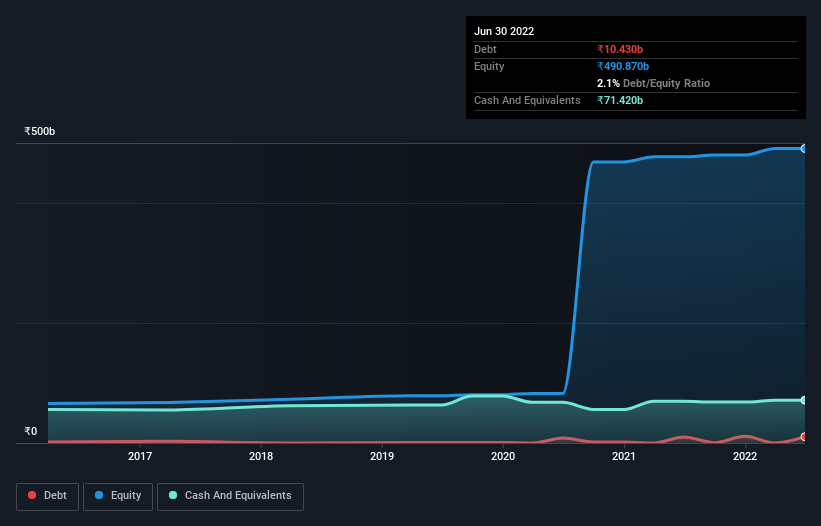- India
- /
- Personal Products
- /
- NSEI:HINDUNILVR
These 4 Measures Indicate That Hindustan Unilever (NSE:HINDUNILVR) Is Using Debt Safely

The external fund manager backed by Berkshire Hathaway's Charlie Munger, Li Lu, makes no bones about it when he says 'The biggest investment risk is not the volatility of prices, but whether you will suffer a permanent loss of capital.' So it might be obvious that you need to consider debt, when you think about how risky any given stock is, because too much debt can sink a company. As with many other companies Hindustan Unilever Limited (NSE:HINDUNILVR) makes use of debt. But the more important question is: how much risk is that debt creating?
When Is Debt Dangerous?
Debt assists a business until the business has trouble paying it off, either with new capital or with free cash flow. In the worst case scenario, a company can go bankrupt if it cannot pay its creditors. However, a more frequent (but still costly) occurrence is where a company must issue shares at bargain-basement prices, permanently diluting shareholders, just to shore up its balance sheet. Of course, debt can be an important tool in businesses, particularly capital heavy businesses. The first thing to do when considering how much debt a business uses is to look at its cash and debt together.
Check out our latest analysis for Hindustan Unilever
What Is Hindustan Unilever's Debt?
The chart below, which you can click on for greater detail, shows that Hindustan Unilever had ₹10.4b in debt in March 2022; about the same as the year before. But it also has ₹71.4b in cash to offset that, meaning it has ₹61.0b net cash.

How Strong Is Hindustan Unilever's Balance Sheet?
The latest balance sheet data shows that Hindustan Unilever had liabilities of ₹112.8b due within a year, and liabilities of ₹101.5b falling due after that. Offsetting this, it had ₹71.4b in cash and ₹29.0b in receivables that were due within 12 months. So its liabilities outweigh the sum of its cash and (near-term) receivables by ₹113.9b.
Having regard to Hindustan Unilever's size, it seems that its liquid assets are well balanced with its total liabilities. So while it's hard to imagine that the ₹6.20t company is struggling for cash, we still think it's worth monitoring its balance sheet. Despite its noteworthy liabilities, Hindustan Unilever boasts net cash, so it's fair to say it does not have a heavy debt load!
And we also note warmly that Hindustan Unilever grew its EBIT by 13% last year, making its debt load easier to handle. There's no doubt that we learn most about debt from the balance sheet. But it is future earnings, more than anything, that will determine Hindustan Unilever's ability to maintain a healthy balance sheet going forward. So if you want to see what the professionals think, you might find this free report on analyst profit forecasts to be interesting.
Finally, while the tax-man may adore accounting profits, lenders only accept cold hard cash. Hindustan Unilever may have net cash on the balance sheet, but it is still interesting to look at how well the business converts its earnings before interest and tax (EBIT) to free cash flow, because that will influence both its need for, and its capacity to manage debt. Over the most recent three years, Hindustan Unilever recorded free cash flow worth 60% of its EBIT, which is around normal, given free cash flow excludes interest and tax. This free cash flow puts the company in a good position to pay down debt, when appropriate.
Summing Up
While it is always sensible to look at a company's total liabilities, it is very reassuring that Hindustan Unilever has ₹61.0b in net cash. And it also grew its EBIT by 13% over the last year. So is Hindustan Unilever's debt a risk? It doesn't seem so to us. The balance sheet is clearly the area to focus on when you are analysing debt. But ultimately, every company can contain risks that exist outside of the balance sheet. For example, we've discovered 1 warning sign for Hindustan Unilever that you should be aware of before investing here.
At the end of the day, it's often better to focus on companies that are free from net debt. You can access our special list of such companies (all with a track record of profit growth). It's free.
If you're looking to trade Hindustan Unilever, open an account with the lowest-cost platform trusted by professionals, Interactive Brokers.
With clients in over 200 countries and territories, and access to 160 markets, IBKR lets you trade stocks, options, futures, forex, bonds and funds from a single integrated account.
Enjoy no hidden fees, no account minimums, and FX conversion rates as low as 0.03%, far better than what most brokers offer.
Sponsored ContentValuation is complex, but we're here to simplify it.
Discover if Hindustan Unilever might be undervalued or overvalued with our detailed analysis, featuring fair value estimates, potential risks, dividends, insider trades, and its financial condition.
Access Free AnalysisHave feedback on this article? Concerned about the content? Get in touch with us directly. Alternatively, email editorial-team (at) simplywallst.com.
This article by Simply Wall St is general in nature. We provide commentary based on historical data and analyst forecasts only using an unbiased methodology and our articles are not intended to be financial advice. It does not constitute a recommendation to buy or sell any stock, and does not take account of your objectives, or your financial situation. We aim to bring you long-term focused analysis driven by fundamental data. Note that our analysis may not factor in the latest price-sensitive company announcements or qualitative material. Simply Wall St has no position in any stocks mentioned.
About NSEI:HINDUNILVR
Hindustan Unilever
A fast-moving consumer good company, manufactures and sells food, home care, personal care, and refreshment products in India and internationally.
Excellent balance sheet with proven track record and pays a dividend.


